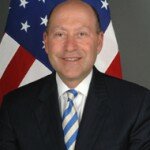An excerpt from the transcript of the press conference with President Funes at the National Palace in San Salvador, El Salvador.
***
MR. CARNEY: The first question from the White House Press Corps will be from Juliana Goldberg of Bloomberg.
Q Thank you, Mr. President. Thank you, President Funes.
Mr. President, on Libya, coalition partners can’t seem to agree on who will take the lead in the next phase of the military campaign. Can you today still assure the American people that the U.S. will be in charge for only a matter of several — a few more days?
And also we also learned today of two American pilots who went down in Libya. We’re assured that they’re safe. But have you sufficiently prepared the American people for the costs of war — of course, the human costs, but also the financial costs?
PRESIDENT OBAMA: Let me, first of all, say obviously we were extraordinarily relieved to find out that these two young men were safe in American hands. As the Pentagon indicated, this appears to have been a malfunction in the aircraft, and it is a testament to our military that we have fully prepared for any contingency, including something like this, and they were able to recover these individuals rapidly.
And in fact, as part of the planning effort leading up to this, I specifically had discussions with Admiral Mullen and other of our military personnel to make sure that we had the kind of standard recovery efforts in place, because there are risks involved. And on the day that I indicated that this was a possibility, and then on the day that I indicated that we, in fact, were moving forward, I said that there is no military operation that does not entail risk. And that’s why this is always the most difficult decision that I make as Commander-in-Chief and as President of the United States.
Now, I have absolutely no doubt that we will be able to transfer control of this operation to an international coalition. I had discussions with Prime Minister Cameron and President Sarkozy today. In fact, NATO is meeting today as we speak to work out some of the mechanisms for command and control. I would expect that over the next several days you will have clarity and a meeting of the minds of all those who are participating in the process.
We’re already seeing a significant reduction in the number of U.S. planes that are involved in operations over Libya, because, as I said initially, our job was to take our unique capabilities and create a space to shape the environment so that the operation of a no-fly zone could operate effectively, and to make sure that our immediate humanitarian goals could be met.
And I just want to emphasize to the American people, because of the extraordinary capabilities and valor of our men and women in uniform we have already saved lives. In Benghazi, a city of 700,000 people, you had the prospect of Qaddafi’s forces carrying out his orders to show no mercy. That could have resulted in catastrophe in that town. Qaddafi’s forces have pulled back because of this timely intervention.
And obviously there are always risks involved in this kind of operation, but for us to be able to structure something where we bring our unique capabilities to bear to fulfill a mission that is supported by the international community against somebody who was about to direct his armed forces against his people in the most vicious of ways is something that I think the American people, and certainly our American military, should be proud of.
I said at the outset that this was going to be a matter of days and not weeks. And there’s nothing based on how we’ve been able to execute over the last several days that changes that assessment.
Q And on financial costs –
PRESIDENT OBAMA: We will continue to provide details to the American people about the costs of this operation. But because it is limited in time, scope, with a well-defined mission, we’re confident that this is something that we can budget as part of our overall operations. I mean, keep in mind that there are costs involved in the rescue efforts that we are assisting in Japan. Events happen around the world in which the United States, with our unique capabilities, has to respond as a leader in the world community. We build those into our budget. This was something that we can build into our budget, and we’re confident that not only can the goals be achieved, but that at the end of the day the American people are going to feel satisfied that lives were saved and people were helped.
(…)
Q Thank you, Mr. President. Thank you, President Funes. President Obama, you mentioned a few minutes ago how this mission in Libya was narrow in scope, limited in duration. But potentially it seems quite open-ended in the sense that as long as Qaddafi remains in power, civilians presumably will need protection from him. My question to you is, what is your exit strategy for U.S. military involvement if Qaddafi does not succumb to the international pressures to leave? Are you saying, essentially, the U.S. will hang in there militarily in Libya if Qaddafi hangs in there?
And in the grand tradition of U.S. press asking multi-part questions, one more. Setting aside the humanitarian goals that you just mentioned a few minutes ago, can you articulate the U.S. national security interest in military action in Libya? Thank you, sir.
PRESIDENT OBAMA: The military action that we moved forward on, in conjunction with our international partners, was defined by the U.N. Security Council resolution that said we have a humanitarian threat and we need to deal with that humanitarian threat quickly, in part through a no-fly zone, in part by ensuring that humanitarian assistance can get into places that need it. And what we’ve done is to create the space for that to happen.
I think fairly shortly we are going to be able to say that we’ve achieved the objective of a no-fly zone. We will also be able to say that we have averted immediate tragedy.
Now, you were absolutely right that as long as Qaddafi remains in power, unless he changes his approach and provides the Libyan people an opportunity to express themselves freely and there are significant reforms in the Libyan government, unless he is willing to step down, that there are still going to be potential threats towards the Libyan people.
And we will continue to support the efforts to protect the Libyan people, but we will not be in the lead. That’s what the transition that I discussed has always been designed to do. We have unique capabilities. We came in, up front, fairly readily, fairly substantially, and at considerable risk to our military personnel. And when this transition takes place, it is not going to be our planes that are maintaining the no-fly zone. It is not going to be our ships that are necessarily involved in enforcing the arms embargo. That’s precisely what the other coalition partners are going to do.
And that’s why building this international coalition has been so important because it means that the United States is not bearing all the cost. It means that we have confidence that we are not going in alone, and it is our military that is being volunteered by others to carry out missions that are important not only to us, but are important internationally. And we will accomplish that in a relatively short period of time.
Now, with respect to our national interests, the American people and the United States have an interest, first of all, in making sure that where a brutal dictator is threatening his people and saying he will show no mercy and go door-to-door hunting people down, and we have the capacity under international sanction to do something about that, I think it’s in America’s international — in America’s national interest to do something about it.
That doesn’t mean that we can solve every problem in the world. It does mean that when you have not only the United Nations but also the Arab League and also other countries in the Gulf who are saying, we need to intercede to make sure that a disaster doesn’t happen on our watch as has happened in the past when the international community stood idly by.
It is in America’s national interest to participate in that because nobody has a bigger stake in making sure that there are basic rules of the road that are observed, that there is some semblance of order and justice — particularly in a volatile region that’s going through great changes like the Middle East — than does the United States of America.
Now, we’ve already seen what happened in Egypt and Tunisia
– peaceful transitions. We have a huge national interest in making sure that those are successful because if Egypt can make a transition from an autocratic regime to a democracy, if Tunisia can make those same changes, they become models for a peaceful transition that at some point may be adopted by other countries in the region.
If on the other hand, they spill into chaos, in part because they’ve got a million Lebanese — or a million Libyans who are pouring into these countries, and their borders become less secure, and there’s a breakdown of order, that could have spillover effects in the entire region.
So not only do we have a humanitarian interest, but we also have a very practical interest in making sure that the changes that are sweeping through that region are occurring in a peaceful nonviolent fashion.
And when we can have some impact on that with a relatively modest contribution as part of a broader international effort, then I absolutely believe that the costs are outweighed by the benefits, and that is what drove my decision. And that’s why I think that we need to make sure that we see this through effectively.

